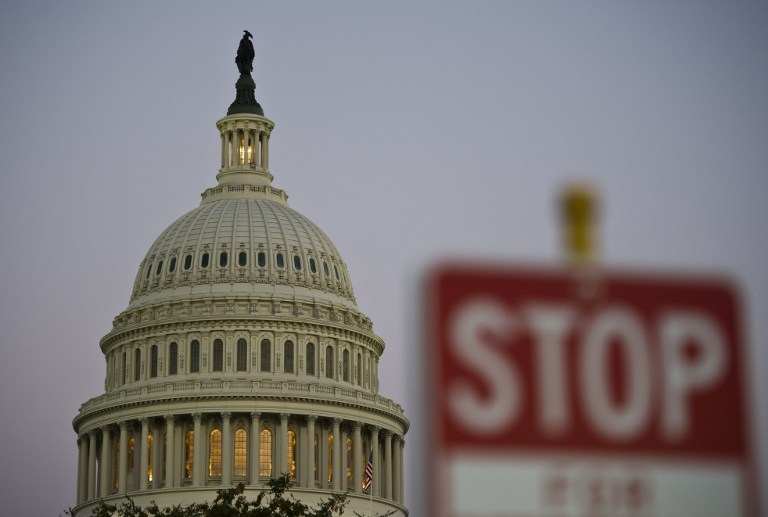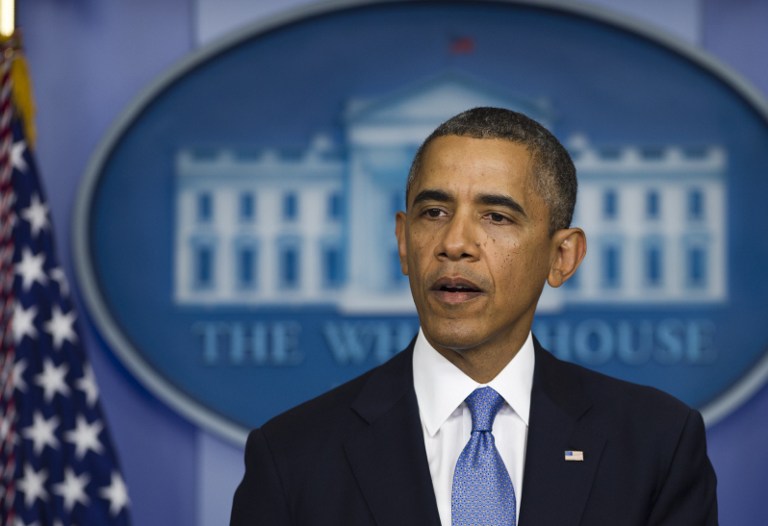SUMMARY
This is AI generated summarization, which may have errors. For context, always refer to the full article.

WASHINGTON DC, United States (4th UPDATE) – The US federal government shut down for the first time in 17 years on Tuesday, October 1, after hours of political brinkmanship failed to end a congressional budget row.
Ten minutes before midnight Monday, September 30, the White House budget office issued an order for many government departments to start closing down, triggering 800,000 furloughs of federal workers, and shutting tourists out of national parks and museums.
The effects ranged from the poignant to the symbolically powerful: a social program that provides food to poor women and children could be hit, and the Statue of Liberty will be shut.
Prospects for a swift resolution were unclear and economists warned that the struggling US economic recovery could suffer if the shutdown drags on for more than just a few days.
READ: Consequences of a US government shutdown
On Tuesday morning, only essential government workers will be at their desks, leaving government departments like the White House with skeletal staff.
Vital functions like mail delivery and air traffic control will continue as normal.
Dysfunction, ugly rhetoric
On a day of dysfunction and ugly rhetoric in the divided US political system, Republicans had repeatedly tied new government funding to attempts to defund, delay or dismantle President Barack Obama’s signature health care law.
But each time, their effort was killed by Obama’s allies in the Democratic-led Senate, leaving the government in limbo when its money ran out at the end of the fiscal year at midnight Monday.
READ: US Senate rejects House budget, hours to shutdown
“This is an unnecessary blow to America,” a somber Senate Majority Leader Harry Reid said on the Senate floor two minutes after the witching hour.
He blamed the Tea Party faction of the Republicans, determined to erase the law designed to provide health care for millions that now lack it.
It is “embarrassing that these people who are elected to represent the country are representing the tea party, the anarchists,” Reid said.
Public derision
On the Internet, Twitter lit up with derision.
READ: US government: ‘Sorry, we’re closed’
“I am so ashamed of my government and sick and tired of hearing whose fault it is. Just get it done,” a person who signs as Afifeh Alaween wrote in a typical post.
The US Capitol – the seat of Congress – put out this one: “Due to a lapse in government funding, this account will not be active until further notice.” That message was retweeted more than 13,000 times.
Due to a lapse in government funding, this account will not be active until further notice.
— U.S. Capitol (@uscapitol) October 1, 2013
A Quinnipiac University poll released early Tuesday said Americans oppose the shutdown of the government as a way to derail Obamacare by a margin of 72% to 22%.
A few hours into the shutdown, Republicans in the House appointed delegates, or conferees, to try to negotiate with the Senate later Tuesday on a spending plan to get the government up and running again.

But if they still want to tinker with Obamacare, the Senate will not negotiate, an aide to Reid said.
Obama, heralding the first government shutdown since 1996, told US troops in a video that they deserved better from Congress, and promised to work to get the government reopened soon.
Holding America ‘hostage’
Obama earlier accused Republicans of holding America to ransom with their “extreme” political demands, while his opponents struck back at his party’s supposed arrogance.
READ: Obama: Republicans appeasing ‘extremists’ on shutdown
House Speaker John Boehner rebuked Obama in a fiery floor speech after an unproductive call with the president.
Republicans accuse Obama of refusing to negotiate in good faith, but the White House says Obamacare is settled law and says there is no way to stop it from going into force, with a goal of providing affordable health care to all Americans.
The crisis is rooted in the long running campaign by “Tea Party” Republicans in the House to overturn or disable Obamacare – the president’s principal domestic political achievement – key portions of which also come into force on Tuesday.
More broadly, the shutdown is the most serious crisis yet in a series of rolling ideological skirmishes between Democrat Obama and House Republicans over the size of the US government and its role in national life.
“One faction of one party in one house of Congress in one branch of government doesn’t get to shut down the entire government just to re-fight the results of an election,” Obama said, referring to his own re-election. He spoke in a televised statement from the White House.
Obama warned that a government shutdown could badly damage an economy which has endured a sluggish recovery from the worst recession in decades.
Economic disruption
“A shutdown will have a very real economic impact on real people, right away. Past shutdowns have disrupted the economy significantly,” Obama said.
READ: US economy faces hefty hit if government shuts down
Consultants Macroeconomic Advisors said it would slow growth, recorded at a 2.5% annual pace in the second quarter.
A two-week shutdown would cut 0.3 percentage point off of gross domestic production.
It would also have a painful personal impact on workers affected – leaving them to dip into savings or delay mortgage payments, monthly car loan bills and other spending.
Market reaction to the shutdown was muted, with Asian stocks closing mixed, with Tokyo gaining 0.20% while Sydney fell 0.23%.
READ: US gov’t shutdown puts global economy at risk – British PM
European stocks were also mixed at the start of trading, with London dipping slightly 0.06 percent, and Frankfurt’s DAX 30 rising 0.28 percent.
Republicans are also demanding Obama make concessions in the health care law to secure a lifting of the current $16.7 trillion debt ceiling, without which the United States would begin to default on its debts for the first time in history by the middle of October. – Rappler.com
Add a comment
How does this make you feel?
There are no comments yet. Add your comment to start the conversation.